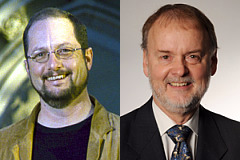Christian versus Atheist arguments
Aractus
You know time and time again I see Christians and atheists making exactly the same arguments against each other, oblivious to the fact that their argument is equally absurd as the one levelled at them from the other side. If you’re going to get into these discussions and debates you should observe a few simple principles:
- Keep an open mind – they might have an excellent response or argument.
- Keep a level playing field – you have to play by the same rules and keep them honest and consistent. For example don’t say they can’t make reference to their ancient texts because then neither can you.
- Don’t make rushed arguments – either learn the material first and be sure your argument is valid, or don’t make it in the first place.
Now I’m specifically going to talk about sins of the atheists here, since they so often claim to be more informed all the while spurting ignorant, ill-informed bullshit based on their own biased blind-beliefs and not based on real tangible evidence.

So let’s have some examples. There are a good few atheists who claim that the Bible isn’t evidence – well then neither is any historical document. There are 66 books in the Bible (73 in the Catholic Bible and more still in some Orthodox cannons) and some have a greater historical validity than others. You can’t simply dismiss the credibility of the books because they are in the Bible – just like Christians can’t discard the validity of other texts because they aren’t in the Bible. In fact a Christian would tell you that the reason why the books got bound into the Bible in the first place was because they were determined by the religious authorities of the time to be genuine. These two handsome fellows above are scholars – they’re New Testament era historians – and they both say there is hard evidence for the existence of Jesus as a historical figure – and so does just about every other scholar. This in-turn means they have determined that at least part of the New Testament constitutes (or contributes to providing) hard evidence for the existence of Jesus. Hurtado mentions it many times on his blog, and Ehrman says it in this youtube video (and probably also on his subscription blog). As Hurtado puts it you are not entitled to your own truth: you need to go to the experts to get the facts.
Often times atheists use poor quality material to get their “academic information” from. There are reliable sources out there – for example try the New Oxford Annotated Bible (4th.Ed 2010) instead of the Skeptic’s Annotated Bible. And in my view you should supplement the Oxford Bible with any decent Evangelical commentary since the Oxford text often leaves out both sides of the argument and fails to even acknowledge perfectly reasonable arguments from scholars that disagree with them. Any time you read a book ask yourself who the author is, what their credentials are, and most importantly what other academics/scholars say about this person. Too often atheists gravitate towards the quacks who make extreme arguments suck as Jesus Mythicism instead of constructing valid objections to the content of the Bible.


Sometimes atheists say that because there are some clear inaccuracies that the Bible has no historical credibility. Herodotus had historians convinced for over 2,000 years that the Pyramids of Giza were built by slave workers. Yet it wasn’t his intention to deceive, and just because of that one monumental fuck-up historians don’t throw out everything else he wrote – they still treat him as a serious historian. In the New Testament one writer in particular talks extensively about contemporary issues – and that’s Paul. He has more to say about the present time than about the time that Jesus lived in. I find it incredibly naive of people that would claim that those writings are “not history”. Furthermore it is disingenuous to claim that scholars can’t learn anything of value from the Bible – it not only tells them quite a bit about the ministry of Jesus, it also tells them about what the early Christians believed when those books were written. When Matthew 14 says that Jesus walked on water; that tells you that the author of the gospel believed that Jesus had walked on water. And just because that may not be physically possible from the point of view of a sceptic doesn’t meant that Jesus didn’t deliver the Sermon on the Mount or come up with the parable of the Good Samaritan.
 Sometimes atheists make the claim that Jesus never really existed and he was a myth. Rubbish. I have yet to see a serious contemporary scholar that holds that view. Instead, atheists invoke crackpot wannabe historians like Kenneth Humphreys who are unqualified to offer a meaningful opinion in the first place. If you’re going to listen to unqualified people instead of the experts in the field, then you may as well get your archaeological information from Ron Wyatt and his crackpot fundamentalist young-earth science-denying creationist peers instead of real experts who are respected in their field like Israel Finkelstein (pictured). If you won’t accept respected NT scholars as a source of evidence then you can’t expect Christians to accept your respected scholars either. Cherry-picking unqualified people to get your information from is not valid. A NT scholar is a qualified historian who specialises in New Testament period history and can read Greek. And an expert would be someone that is involved in research and publishes evidence (eg peer-review material). An Old Testament scholar is a qualified historian who can read Hebrew, and who specialises in Old Testament history. Finkelstein is an OT Scholar, but he seldom calls himself that, instead he’s better known as an Israeli archaeologist because he focuses on the history of ancient Palestine (Israle/Judah) area. Because he researchers and publishes evidence, he’s also an expert. Not all scholars call themselves scholars, and many are simply students and not experts.
Sometimes atheists make the claim that Jesus never really existed and he was a myth. Rubbish. I have yet to see a serious contemporary scholar that holds that view. Instead, atheists invoke crackpot wannabe historians like Kenneth Humphreys who are unqualified to offer a meaningful opinion in the first place. If you’re going to listen to unqualified people instead of the experts in the field, then you may as well get your archaeological information from Ron Wyatt and his crackpot fundamentalist young-earth science-denying creationist peers instead of real experts who are respected in their field like Israel Finkelstein (pictured). If you won’t accept respected NT scholars as a source of evidence then you can’t expect Christians to accept your respected scholars either. Cherry-picking unqualified people to get your information from is not valid. A NT scholar is a qualified historian who specialises in New Testament period history and can read Greek. And an expert would be someone that is involved in research and publishes evidence (eg peer-review material). An Old Testament scholar is a qualified historian who can read Hebrew, and who specialises in Old Testament history. Finkelstein is an OT Scholar, but he seldom calls himself that, instead he’s better known as an Israeli archaeologist because he focuses on the history of ancient Palestine (Israle/Judah) area. Because he researchers and publishes evidence, he’s also an expert. Not all scholars call themselves scholars, and many are simply students and not experts.

“We can never know what the bible originally said because it’s been copied and translated too many times”. This is an argument I’ve heard a few times recently. It’s completely uninformed. Yes the Bible has been translated into dozens of languages – however it also exists in its original form and there are 5800 ancient manuscripts of the New Testament in Greek, with an average length of 450 pages amounting to some 2.5 million leaves or so. Now why do I give you the other numbers where most people stop at the 5800 manuscript number? Because often atheists make the claim that the number is inflated because it counts fragments individually or because it counts individual books. Neither is true. A manuscript includes all fragments and leaves that belong to the same volume of work – and there are only a very few that contain just one fragment. Pictured above is Papyrus 66, it dates to c. 200 AD, is a manuscript containing only the gospel of John, and it’s near complete. It makes consistent use of the Nomina Sacra. Most manuscripts contain multiple NT texts however, and many contain all books plus the apocrypha plus the lxx. Furthermore because there are a number of different early manuscripts representing different textual traditions (i.e. copied from different sources going back generations) scholars have around 99.5% confidence of the near-enough exact wording of the NT. Of that remaining 0.5% most of the differences are not meaningful – but some are for instance if the Number of the Beast is 666 as in most manuscripts or 616 as in Papyrus 115. That’s a much higher degree of confidence in the original wording than any other ancient manuscript. It means they’ve been able to more reliably identify the areas which are additions to the text (such as Jesus saying “let he who is without sin throw the first stone” – sorry guys that sentence it not really in the Bible). Compare this with Antiquities of the Jews by Josephus – the number of ancient manuscripts in Greek is only 10 or 11 and the earliest is c. 10th century.

Many times I hear atheists denying that religious practise has health benefits. There is great danger in doing so. Firstly it doesn’t prove any religion right anyway because it doesn’t matter what the religion is – it could be Christianity or Hinduism or any religion. Secondly this denialism leads to denying people the access that they need to their religion, which in-turn will cause far greater harm than good. Religious and cultural/ethnic practise are important determinants of health. I find it incredible that so many atheists refuse to accept this, it’s widely discussed in peer-reviewed literature. Now of course it also has negatives, but for adherents the positives outweigh the negatives at a population level. Not from an individual level; some individuals certainly get the bad end of the stick. Homosexuals for instance. It’s not just religious practises it’s also ethnic and cultural practises. It’s one reason why there is a gap in life expectancy between Aboriginal and non-Aboriginal Australians. It’s important because it needs to be considered when forming healthcare policies in places such as hospitals, retirement homes, in-patient care, in-home care, etc. It’s not disputed in academic circles, it’s accepted fact: “the significant disruption in access to traditional foods, Country and traditional practices (such as their ability to undertake vital societal, legal and religious obligations) played heavily upon the First Peoples’ health and well-being.” (Best & Fredericks [Eds]. 2014. Yatdjuligin: Aboriginal and Torres Strait Islander nursing and midwifery care. p. 11).
Many times I hear atheists try to claim that this is just a benefit from social activity and is not dependant on people practising their religious practises – this is wrong. A paper titled Social Participation and Depression in Old Age: A Fixed-Effects Analysis in 10 European Countries (2015) by Croezen, Avendano, Burdorf, and van Lenthe specifically looked at other social groups in a longitudinal study of older Europeans (over 50 years), and found that Religion was the only type of social activity that improved the health of people suffering depression. Participation in voluntary work/charities, education/training, sports/social clubs, or political/community organisations did not improve health. Yes it might have a confounder, but note that the authors did say the study was controlled for possible confounders, and that one has not yet been identified. To quote from the abstract: “Participation in religious organizations may offer mental health benefits beyond those offered by other forms of social participation.” If you’d like something open-access that you can read for yourself right now try the Williams & Sternthal (2007) paper, from which I shall quote and end on this point: “The potential for both positive and negative effects of spirituality on health, combined with the high levels of engagement with spirituality by the Australian population, suggests that this area is ripe for future sustained research. Moreover, Australian patients want their clinicians to incorporate spirituality into their treatment.4,55“